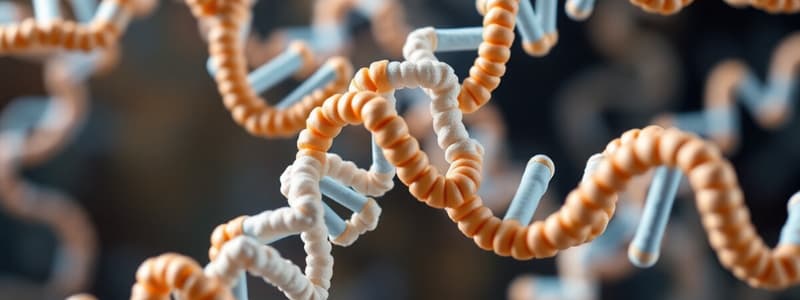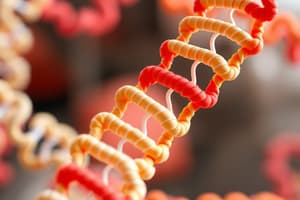Podcast
Questions and Answers
The small ribosomal subunit binds to the mRNA at the start codon, which is ______.
The small ribosomal subunit binds to the mRNA at the start codon, which is ______.
AUG
TRNA-Met, carrying ______, binds to the start codon at the P site of the ribosome.
TRNA-Met, carrying ______, binds to the start codon at the P site of the ribosome.
methionine
Elongation factors are required as ______ bring amino acids to the A site of the ribosome.
Elongation factors are required as ______ bring amino acids to the A site of the ribosome.
tRNAs
A peptide bond forms between the amino acids at the P site and ______ site.
A peptide bond forms between the amino acids at the P site and ______ site.
Translation ends at a ______ codon.
Translation ends at a ______ codon.
What role do initiation factors play in the process of translation?
What role do initiation factors play in the process of translation?
During elongation, what happens immediately after a peptide bond is formed?
During elongation, what happens immediately after a peptide bond is formed?
What triggers the termination of translation?
What triggers the termination of translation?
What is the significance of the P site in the ribosome during translation?
What is the significance of the P site in the ribosome during translation?
What is the initial amino acid added during protein synthesis?
What is the initial amino acid added during protein synthesis?
Match the following components of translation with their respective roles:
Match the following components of translation with their respective roles:
Match the stages of translation with their descriptions:
Match the stages of translation with their descriptions:
Match the following terms with their definitions in translation:
Match the following terms with their definitions in translation:
Match the following steps of translation with their sequence in the process:
Match the following steps of translation with their sequence in the process:
Match the following types of codons with their functions:
Match the following types of codons with their functions:
Flashcards are hidden until you start studying
Study Notes
Initiation
- The small ribosomal subunit binds to mRNA at the start codon (AUG)
- tRNA-Met carrying methionine binds to the start codon in the P site of the ribosome
- The large ribosomal subunit joins to form the full initiation complex
- The process is mediated by initiation factors (proteins)
- Methionine (Met) is removed from the polypeptide sequence after initiation
Elongation
- Elongation factors are required
- tRNAs bring amino acids to the A site of the ribosome, matching the mRNA codon
- A peptide bond forms between the amino acids at the P site and A site
- The ribosome moves (translocates) to the next codon, shifting the tRNA to the E site, where it exits
Termination
- Translation ends at a STOP codon
- Release factors bind, causing the ribosome to release the completed polypeptide chain
Initiation
- The small ribosomal subunit binds to the mRNA, starting at the AUG codon, recognized as the start codon.
- tRNA-Met, carrying the amino acid methionine, binds to the start codon at the P site of the ribosome.
- The large ribosomal subunit joins the small subunit and the tRNA-Met, forming the complete initiation complex.
- Initiation factors, which are proteins, assist in the process of initiation.
- After the initiation process is complete, the methionine (Met) is typically removed from the polypeptide sequence.
Elongation
- Elongation factors, proteins that facilitate the process, are required for elongation.
- tRNAs bring amino acids to the A site of the ribosome. Each tRNA carries a specific amino acid that matches the mRNA codon at the A site.
- A peptide bond is formed between the amino acid at the P site and the amino acid at the A site.
- The ribosome moves to the next codon, shifting the tRNA that was in the A site to the P site and the tRNA from the P site to the E site, where it exits.
Termination
- Translation is terminated when a STOP codon is reached on the mRNA.
- Release factors, proteins that bind to the STOP codon, cause the ribosome to release the completed polypeptide chain.
Initiation
- The small ribosomal subunit binds to the mRNA at the start codon (AUG).
- The tRNA carrying methionine (tRNA-Met) binds to the start codon at the P site of the ribosome.
- The large ribosomal subunit joins to form the full initiation complex.
- Initiation factors (proteins) mediate the process.
- The methionine (Met) is removed from the polypeptide sequence after initiation.
Elongation
- Elongation factors are required for this stage.
- tRNAs bring amino acids to the A site of the ribosome, according to the matching mRNA codon.
- A peptide bond forms between the amino acids at the P site and A site.
- The ribosome translocates to the next codon, shifting the tRNA to the E site, where it exits.
Termination
- Translation ends at a STOP codon.
- Release factors bind to the STOP codon, causing the ribosome to release the completed polypeptide chain.
Studying That Suits You
Use AI to generate personalized quizzes and flashcards to suit your learning preferences.




